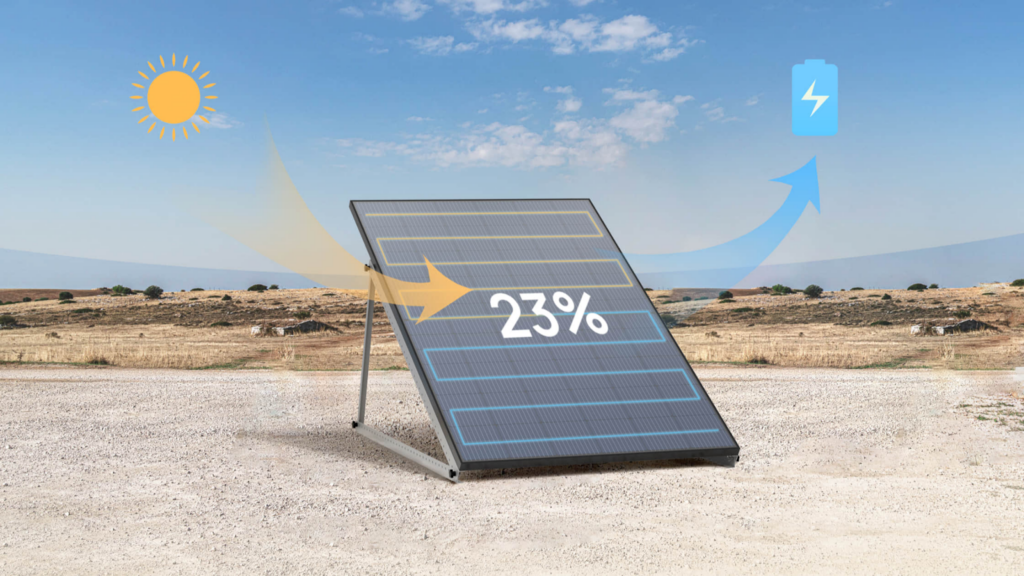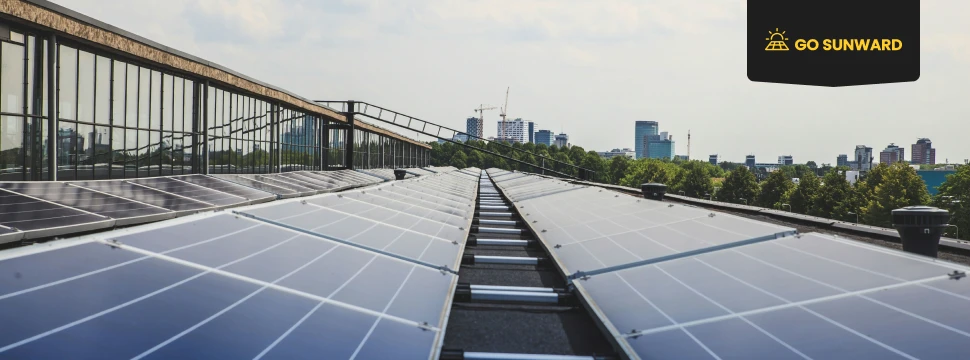Unleash The Power of Efficiency: Understanding Solar Panel Ratings
Are you considering installing solar panels on your home? Understanding solar panel efficiency ratings is crucial in making an informed decision. In this blog post, we will dive into the basics of solar panel efficiency, explore the factors that affect it, discuss how to choose the most efficient panels for your needs, we’ll also highlight the benefits of investing in high-efficiency options.
If you want to become an expert on sunpower, like Gosunward, then learn how to efficiently rate solar panels based on their quality, watts, advantages, materials, and more. Get ready to unleash the power of efficiency and maximize the potential of your solar energy system by understanding solar panel ratings ☀️
What is the average efficiency rating of a solar panel?
The average efficiency rating of a solar panel refers to the ability of the panel to convert sunlight into electricity. It is an important factor to consider when deciding on the type of solar panels to install. The efficiency rating is expressed as a percentage, representing the amount of sunlight that is converted into usable electricity.
Currently, the average efficiency rating of a solar panel ranges from 15% to 20%. This means that for every 100 units of sunlight that hit the panel, 15 to 20 units are converted into electricity. However, it is important to note that there are some panels available in the market with higher efficiency ratings, reaching up to 22% or even higher.
Efficiency is a crucial consideration when choosing solar panels as it directly affects the amount of electricity generated. Higher efficiency panels can generate more electricity with the same amount of sunlight, resulting in increased energy production. This is particularly beneficial for homeowners with limited roof space or when there are shading issues.
It is worth noting that efficiency ratings have been steadily improving over the years as solar technology advances. The average efficiency rating of solar panels has increased from around 12% to its current range of 15% to 20% over the past decade. This improvement in efficiency has made solar power a more viable and cost-effective option for homeowners.
However, it is important to consider other factors such as cost, durability, and warranty when selecting solar panels. The most efficient panels may not always be the most cost-effective option for every homeowner.

The Basics of Solar Panel Efficiency
Solar panel efficiency refers to the amount of sunlight that a solar panel can convert into usable energy. A higher efficiency rating means that the solar panel is able to generate more power from the same amount of sunlight. Most solar panels on the market have an efficiency rating between 13% and 22%.
Understanding solar panel efficiency ratings is crucial when choosing the right system for your home. Panels with lower ratings, such as 13% or 15%, may be more affordable but will require a larger installation area to generate enough electricity. On the other hand, panels with higher ratings like 19%, 21%, or even up to 22% are more expensive upfront but can produce greater amounts of electricity in limited space, offering long-term cost savings and maximizing energy production potential.
What is Solar Panel Efficiency?
Solar panel efficiency refers to the measure of how effectively a solar panel converts sunlight into usable electricity. It is calculated by dividing the maximum power output of the solar panel by the amount of sunlight it receives. Factors that can affect solar panel efficiency include temperature, shading, dust and dirt accumulation, and system design. Higher efficiency ratings, such as 21% or 22%, indicate that the solar panels are more effective at generating electricity from sunlight compared to lower ratings like 13% or 15%. By understanding solar panel efficiency and its calculation, homeowners can make informed decisions when installing solar panels on their homes.
Why is Solar Panel Efficiency Important?
Solar panel efficiency plays a crucial role in energy production. Higher efficiency panels can generate more electricity from the same amount of sunlight, maximizing energy output and reducing reliance on traditional power sources. For example, a 22% efficient solar panel can produce 22% more electricity compared to a panel with only 13% efficiency.
In addition to increased energy production, high solar panel efficiency also brings significant financial benefits. By generating more electricity, homeowners can reduce their reliance on grid-supplied power and potentially earn credits through net metering programs. With an investment in higher-efficiency panels like those rated at 19%, homeowners can see reduced utility bills and enjoy faster payback periods.
Maximizing solar energy generation through improved panel efficiency has substantial environmental benefits as well. It reduces the demand for fossil fuels used in conventional power generation, leading to decreased carbon emissions and air pollution. Panels with efficiencies of 15% or above contribute significantly towards creating a cleaner and greener future by harnessing renewable resources effectively.
Understanding Solar Panel Efficiency Ratings
Types of ratings are used to measure solar panel efficiency, including monocrystalline, polycrystalline, and thin-film technologies. Monocrystalline panels typically have higher efficiency ratings ranging between 19% and 22%. Polycrystalline panels have slightly lower ratings varying from 13% to 15%, while thin-film technologies generally fall within the range of 10% to 12%.
When considering efficiency ratings, it is crucial for homeowners to understand the difference between lab-based rating and real-world performance. While solar panels may achieve high ratings in controlled environments, factors like temperature changes, shading, or dust can affect their actual output. Homeowners should consider not only the initial rating but also how a panel performs in real-life conditions when making their decision.
Factors Affecting Solar Panel Efficiency
Temperature is a key factor that can affect the efficiency of solar panels. High temperatures can cause a decrease in panel performance, as they generate more heat and become less efficient at converting sunlight into electricity.
The quality of materials used in solar panels also plays a vital role in determining their efficiency rating. Panels made with higher-quality materials tend to have better energy conversion rates and are more resistant to wear and tear, resulting in improved overall performance and longevity.
1. Temperature
When it comes to solar panel efficiency ratings, temperature plays a crucial role. High temperatures can negatively impact the performance of solar panels, causing them to lose efficiency. It is important to choose panels with lower temperature coefficients, as they are better equipped to handle hot climates and maintain optimal performance even on scorching summer days.
2. Quality of Materials
When it comes to the quality of materials used in solar panels, there are a few key factors to consider. First and foremost is the type of semiconductor material used. High-quality silicon-based materials tend to have higher conversion efficiencies and longer lifespans compared to alternative options. Additionally, the composition of the panel’s backsheet and frame can greatly impact its durability and resistance to environmental stressors like moisture or UV radiation.
3. Angle and Orientation
Angle and Orientation:
- The angle and orientation of solar panels play a crucial role in maximizing their efficiency.
- Panels that are positioned correctly can capture more sunlight, resulting in increased energy production.
To optimize the angle and orientation of your solar panels:
- Install them facing south to maximize exposure to sunlight throughout the day.
- Adjust the tilt of the panels according to your latitude for optimal performance.
- Avoid shading from nearby trees or buildings that can hinder sunlight absorption.
By taking these factors into consideration, you can ensure higher energy yields from your solar panel installation.
4. Shade and Obstacles
Shade and obstacles can significantly impact the performance of solar panels. When panels are shaded, whether by trees, buildings, or other obstructions, their productivity is reduced as they receive less sunlight. It is important to place solar panels in areas with minimal shade to optimize their efficiency. Additionally, obstacles such as dust or debris can accumulate on the surface of the panels and block sunlight from reaching them. Regular cleaning and maintenance are essential to ensure maximum energy generation from your solar system.
How to Choose the Most Efficient Solar Panels
High efficiency ratings should be a top priority when choosing solar panels. Look for panels with a high efficiency rating, as this indicates that they can convert more sunlight into electricity. Higher efficiency means greater energy production and ultimately more savings on your energy bills.
In addition to considering the efficiency rating, it’s important to evaluate your specific needs and budget. Determine how much electricity you need and what you can afford before making a decision. This will help you find the most efficient solar panels that align with your requirements without breaking the bank.
Lastly, don’t forget to compare different solar panel brands. Each brand may have varying levels of quality and performance, so take the time to research customer reviews and expert opinions. By comparing different options, you can ensure that you choose the most efficient solar panels for your home.
Remember: high-efficiency ratings are crucial in selecting solar panels; consider your needs and budget; compare various brands for optimal results. Or start with the basics and learn how solar panels work here.




